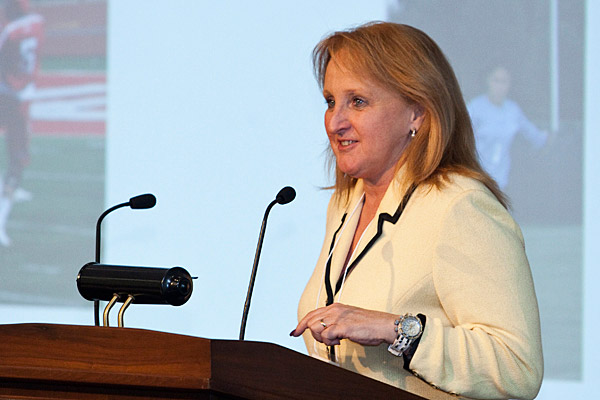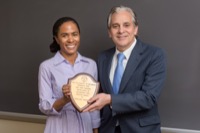
Research superstar
UD professor receives prestigious NIH MERIT Award for ACL research
7:59 a.m., March 8, 2012--Lynn Snyder-Mackler, Alumni Distinguished Professor of Physical Therapy at the University of Delaware, has spent the past two decades developing evidence-based approaches to the rehabilitation of knee injuries.
Now, her dedication has paid off, as her accomplishments have been recognized with a prestigious MERIT (Method to Extend Research in Time) Award from the National Institutes of Health (NIH). Snyder-Mackler joins an elite group of researchers in receiving the award, which will provide her with up to 10 years of funding for her research.
Honors Stories
National Medal of Science
Warren Award
“The NIH MERIT Award signifies that the awardee’s work is so impactful and of such significance that longer, more sustained funding is warranted,” says UD provost Tom Apple. “This is a rare award and a sign that Lynn is one of the superstars in her field.”
Snyder-Mackler’s work has focused on knee, shoulder, and spine rehabilitation, but she is perhaps best known for her work on anterior cruciate ligament (ACL) injuries.
Most recently, she has teamed with researchers and clinicians at Oslo University Hospital in Norway in the development of a screening procedure to provide clinicians with treatment options that may improve function after ACL injury and reconstruction.
Snyder-Mackler emphasizes that those options include non-surgical alternatives.
As an example, she cites a high school soccer player who tears his ACL during preseason practice. If he has surgery, the season will be over by the time he has recovered. He’s a senior and doesn’t plan to continue with the sport in college.
“There are considerable social benefits to this athlete playing out his last year and delaying the surgery until the season is over. In fact, he may not even need surgery if he doesn’t plan to do anything but straight-on running in the future,” says Snyder-Mackler.
A delay in surgery enables some people, a group Snyder-Mackler calls copers, to regain knee stability simply through neuromuscular training. But which people fall into that category and which are non-copers? Can non-copers become copers—or vice versa—after a regimen of therapy?
Snyder-Mackler’s research team, including co-investigator Dr. Michael Axe, a local orthopedic surgeon, identified some clinical markers to distinguish between those with good and poor dynamic knee stability during the first five years of this work. However, to test their hypothesis, they needed a cohort of patients with torn ACLs who were not operated on early after injury.
That proved to be difficult in the U.S., but in Norway, no one has reconstructive surgery without first undergoing at least three months of rehabilitation.
“Our work over the past five years with our collaborators in Oslo, Professor May Arna Risberg and orthopedic surgeon Dr. Lars Engebresen, has provided considerable evidence to support our hypothesis that there is a differential response to ACL injury and that this response can be affected by rehabilitation,” Snyder-Mackler says. “It’s also demonstrated that as rehabilitation continues before surgery, stability strategies change. Categories are fluid—non-copers can become more stable, and potential copers can become unstable.”
“Even more important,” she adds, “we’ve found that while surgery introduces passive stability, a successful outcome is not guaranteed. Many patients who have undergone surgery achieve normal measures of strength and laxity, or looseness, but still can’t return to competitive sports.”
Snyder-Mackler’s work makes a strong argument for a period of rehabilitation for all ACL patients, but she hopes to do additional studies in what she calls a “waiting list” country, where surgery is delayed for as long as 18 months to two years.
“That could tell us even more about what happens to copers and non-copers over time and what rehabilitation strategies are most effective,” she says. “Ultimately, our goal is to obtain data that will not only guide future research but also have a direct impact on clinician and patient decision making.”
Stuart Binder-MacLeod, chair of the UD Department of Physical Therapy, points out that Snyder-Mackler is among a very small group of clinical researchers to be recognized with the NIH MERIT Award.
“This shows very clearly the importance and impact of her work,” he says. “Her research has been rated very highly not only by her peers but also by the next level—the National Advisory Child Health and Human Development Council—and they have placed her among the most outstanding scientists supported by the institute.”
About Lynn Snyder-Mackler
Lynn Snyder-Mackler earned her doctoral degree in applied anatomy and physiology from Boston University and joined the UD faculty in 1989.
A prolific author, she has written more than 100 research articles, 30 book chapters and monographs, and textbooks on electrotherapy and sports physical therapy. She serves on the editorial boards of the Journal of Orthopedic and Sports Physical Therapy, Journal of Sports Rehabilitation, and Physical Therapy in Sport and has given more than 165 presentations on her research in the U.S. and 12 foreign countries.
Her study results also have been reported by The New York Times, USA Today, United Press International, and other major media.
She is the recipient of numerous awards from the American Physical Therapy Association, which named her a Catherine Worthingham Fellow, the highest honor in the profession, in 2003. In 2009, she won the Francis Alison Faculty Award, the University's highest faculty honor.
Snyder-Mackler is academic director of the University of Delaware Physical Therapy Clinic and residency director of the Sports Physical Therapy Residency at UD.
About the NIH MERIT Awards
Initiated by NIH in 1986, Method to Extend Research in Time (MERIT) Awards are offered to a limited number of investigators who have demonstrated superior competence and outstanding productivity during their previous research endeavors and who are likely to continue to perform in an outstanding manner in the future.
The principal feature of the MERIT Award is the opportunity to obtain up to ten years of research support in two segments and thereby relieve awardees of the need to prepare frequent renewal applications.
Over the past 25 years, the MERIT Award has become a symbol of scientific achievement in the research community.
Article by Diane Kukich
Photo by Ambre Alexander








